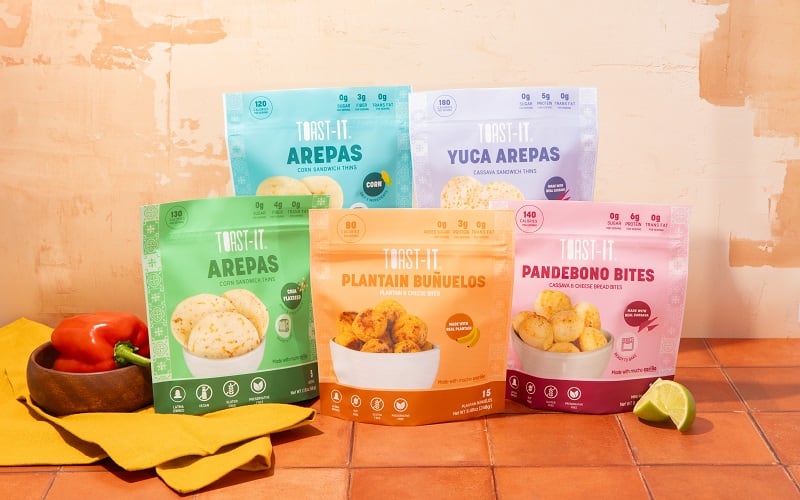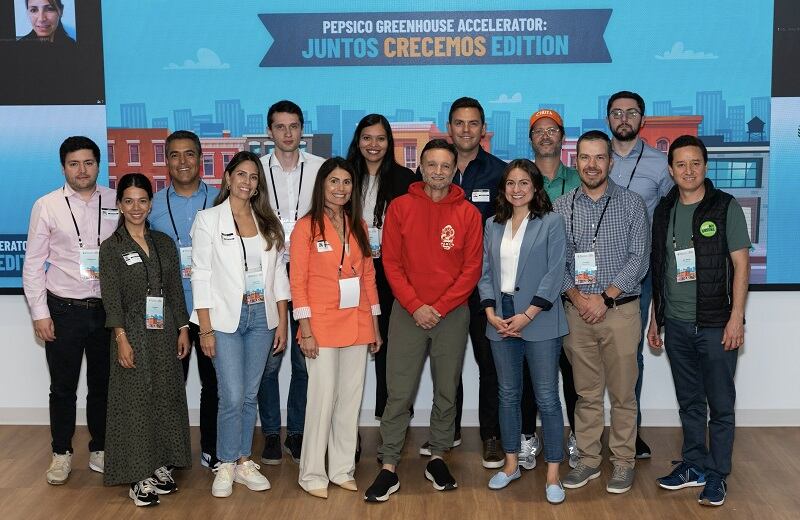“Mafe and Coco have built the magical bond of sisterhood into a formidable business partnership. As a confused Mexican Jewish American and co-founder of SOMOS Mexican foods, I love discovering companies like TOAST-IT that have mastered the formula for bringing beloved Hispanic staples to mainstream consumers in a format that is delicious and convenient,” said Lubetzky.
Honoring their Venezuelan heritage
TOAST-IT is a Venezuelan frozen food brand offering arepas – South and Central American bread that is eaten “as a snack, for breakfast, [and]... throughout the day,” Coco Cabezas said. The Arepas are available in Original, Chia Flaxseed, and Cassava varieties and can be found at Walmart, Publix, and Winn Dixie, and will launch in Whole Foods in the southeast this month, she added.
When the sisters moved to the US, they realized that the Hispanic food on the market didn’t represent the food they grew up with, so they set out to create a brand to honor that heritage.
“It literally starts with a person missing their food and trying to create something to fill that gap ─ that need. But then, we are seeing how people from other nationalities love [arepas] and love to have the convenience to try something that they might have tried when they traveled to Colombia,” Coco Cabezas said.
Setting up the brand’s next step with Shark Tank funding
TOAST-IT will use the Shark Tank funding to build out the next step for its brand while incorporating the advice shared on the episode into its business strategy, which includes a keener focus on driving its margins through packaging and ingredient innovation, Mafe Cabezas said.
“Having the opportunity to not only go there and tape and get to meet the Sharks in person but also teaching our company and getting some feedback from them was incredible. It was also nerve-wracking, to be honest; it was very intimidating,” Mafe Cabezas said. “Once we were actually able to go through the Tank and actually pitch our products, ... everything became a little bit more organic, and we were so excited to be there that we were actually enjoying the experience.”
TOAST-IT is currently working “through any implications that might happen from being on the show as far as inventory" and increased inventory in anticipation of a post-show increase in sales, Mafe Cabezas said.
The sisters will use the money to strategically grow its retail presence, focusing on the demographics and geographies where they can make the most impact, she added. Currently, TOAST-IT is primarily focused on the Southeast, but it would like “to expand to the northeast and Texas next,” Coco Cabezas said.
“It's all about being strategic and aiming for retailers where do you think your target demographic is located from a physical standpoint, and do you have a high chance of performing well in those retailers. Getting in, it's one thing, and it's really hard and competitive. But then, the hardest part comes after, which is staying on the shelf and selling.”
Bringing more globally inspired foods to the frozen aisle
Consumers' growing interest in foods and beverages from across the globe has spurred demand for global flavors, and consumers who migrated to the US are also looking for these products on store shelves, Mafe Cabezas noted. At the same time, consumers are looking for products that have a cleaner and healthier ingredient panel, Coco Cabezas said.
"Here in Florida, there are a number of companies trying to do Hispanic products, but one thing that we saw that was missing entirely was that focus on health, on great ingredients, on the gluten-free, [and] the vegan," she added. “In Latin America, we're used to eating organic; we're used to eating super clean. We don't really eat that many processed foods; we're used to eating just ... really raw ingredients.”
While growing throughout the grocery store, global flavors have lagged in the frozen aisle, which the sisters saw as an area to innovate. By releasing a frozen product, TOAST-IT was able to stay true to its mission of creating a better-for-you product that stayed true to the sisters' heritage.
"In our case, we didn't really choose frozen because it was trending or anything. We basically chose to make our products [frozen] because we didn't want to add any preservatives. We want to keep the recipe super, super authentic, super true to what they were back home and to our abuela's cookbook."





